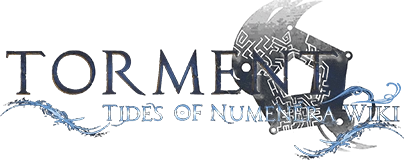Torment: Tides of Numenera follows in the footsteps of its venerable predecessor. Much like Planescape: Torment, it's a narrative-heavy game, where your interactions with other people and the decisions you take matter a lot more than cleaving your foes apart. Violence is rarely the only - or the best - solution too.
Character creation[ | ]
- Numenera has a simple, straightforward character system and Torment reflects that. Character creation takes place over several fathoms (areas within the Labyrinth, your Castoff's mind). The very first sequence that takes place in the Dark Fathom allows you to resolve three situations, making decisions. Pay attention to the situations described, as they will be referenced heavily throughout the game.
- The decisions will cause the game to suggest a build for you, but you are in no way bound by the suggestion. The mirror will allow you to choose between three character types, each suited for a different playstyle. Nanos and glaives are mages and warriors respectively, while the Jack is essentially a jack-of-all-trades character. Neither a good fighter nor a mage, the Jack compensates for this reduced potential with the broadest array of skills.
- While there's no perfect build, you definitely want to pick up Anamnesis and put at least a couple of points to Intellect to get the most out of the Torment experience, recalling memories with greater ease. Note that the points will have to last you a while, as opportunities to increase stats are infrequent.
- To complete character creation, you need to head to Circus Minor and enter the Clock Fathom after talking to Casmeen. That's when you choose your focus and can stop staring with envy at Aligern and Castillege.
Crisis[ | ]
- You're introduced to Crisis mode after completing the Dark Fathom. You are confronted by The Sorrow, a mysterious entity, and are tasked with defeating it. In a Crisis, your goal is to overcome the obstacles in your path, fulfilling the objectives listed in the window to the right of your screen.
- Note that overcoming does not mean killing. You do not receive additional experience points for killing enemies and even the loot received for doing so is limited. The Hide ability is very useful, as it allows you to evade confrontation and remain invisible, until you attack, take an action described as breaking cover, or if the foes successfully use a detection ability during their turn.
- Most crises also have alternative solutions. You can talk to people in a Crisis, you can use the scenery to your advantage or simply sneak through encounters.
Effort[ | ]
- Effort is another unique mechanic. Each of your stats has a limited pool, which you spend on tasks - using strength to move items, picking locks, persuading others. You have to balance certainty of outcome with the availability of attempts - running out of a statistic mid-dialogue can be problematic... However, even failures can lead to interesting outcomes.
- You can replenish pools by using various usables, such as the Encephalic Rush for
 Intellect or by paying a couple shins to rest. Every major area has a place you can rest, for example, in Sagus Cliffs it's Casmeen at the Changing God Cult camp in Circus Minor or Tranquility in the Caravanserai.
Intellect or by paying a couple shins to rest. Every major area has a place you can rest, for example, in Sagus Cliffs it's Casmeen at the Changing God Cult camp in Circus Minor or Tranquility in the Caravanserai. - Always consider your options when choosing to make an effort. And save often!
Decisions and Tides[ | ]
- All of the game's quests boil down to making decisions. The key thing to understand here is that the decisions aren't inherently bad or wrong and there's no proper way to play through the game.
- The game supports your decisions through the Tides system, which reflect your character along five axes: Gold, Silver, Red, Blue, and Indigo. Each corresponds to a different characteristic and once you accumulate enough points, it becomes a dominant tide, subtly affecting how other character react to your presence.
- The best way to play is to decide on defining character traits for your Castoff. Charitable, curious, selfish, ignorant, and consistently play out the encounters as your character would.
- Enjoy!
